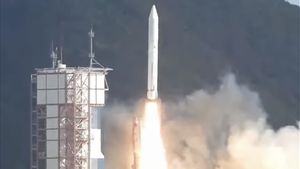YOGYAKARTA - When boarding the train, many passengers carry various kinds of luggage. However, although it is allowed to include many items, passengers are not allowed to carry goods or carelessly. There are rules of luggage on trains that must be obeyed by every passenger.
There are train passengers who only carry bags containing goods as needed. However, not a few also carry some items, such as cardboard, suitcases, and other packages. KAI provides a place to put items on the shelves on the seats. Of course passengers must be aware of themselves in using space for various other passengers.
To maintain the safety and comfort of passengers enjoying the trip, KAI enforces the rules of luggage on trains. Provisions regarding luggage include the weight and dimensions of goods and the type of goods.
The following are a number of rules imposed by PT KAI regarding luggage on trains, which must be known by passengers:
In order to support the needs of passengers traveling by train, PT KAI allows each passenger to carry a trunk with a maximum weight of 20 kg. In addition, the volume of goods that can be carried by each passenger is a maximum of 100 dm3 with a maximum dimension of 70 cm x 48 cm x 30 cm.
Each passenger is allowed to carry as many goods as possible consisting of 4 koli (share items) without being charged an additional fee. If the goods brought have a weight of more than 40 kg or dimensions of more than 200 dm3 (70 cm x 48 cm x 60 cm) then they cannot be placed in the train cabin. Passengers are advised to use goods delivery services, one of which is through KAI logistics which is one of the subsidiaries of PT KAI.
If passengers carry goods weighing more and the size according to the provisions (20 kg and volume 100 dm3), they are allowed to be placed on the train but will be subject to additional costs. The following is the cost of excess baggage that passengers must pay:
There are several types of goods that train passengers are not allowed to carry. PT KAI prohibits passengers from carrying the following items: firearms and sharp weapons, psychotropic/other addictive narcotics, animals, things that are easily explosive/burned, surfboards, and items that smell sick/rotating because they interfere with the comfort of other passengers.
In addition, passengers are also not allowed to carry goods which according to the officer's consideration are inappropriate to be transported as baggage, either in terms of magnitude or condition of goods. Passengers are also not allowed to carry goods that are prohibited by the law.
Passengers who violate the provisions of luggage (in terms of weight or size and do not have a baggage letter, will be subject to a fine. Passengers must pay a fine of Rp. 15,000, 1/25kg for non-commercial economy class trains, Rp. 30,000, 1/25kg for commercial business/economic class trains, and Rp. 50,000, 1/25kg for executive class trains. The calculation of baggage weight is rounded up on a multiplicity of 5 kg.
PT KAI is not responsible if there is damage or loss of passenger goods. Each passenger is asked to guard their respective belongings. However, if the passenger loses goods or is left on the train, then they can ask for help from the Polsuska on duty.
Passengers are allowed to take bicycles on trains but only folding types of bicycles. Folding bikes are allowed to be carried, namely with a maximum weight of 20 kg and a maximum wheel size of 22 inches. In addition, folding bikes must also enter the maximum dimension of 100 cm x 40 cm x 30 cm.
Such is information on the rules of luggage on trains that must be understood and obeyed by every passenger. In addition to carrying goods by following a number of the above provisions, passengers must also maintain the comfort of other passengers.
Stay up to date with the latest domestic and other overseas news on VOI. You present the latest and most updated nationally and internationally.
The English, Chinese, Japanese, Arabic, and French versions are automatically generated by the AI. So there may still be inaccuracies in translating, please always see Indonesian as our main language. (system supported by DigitalSiber.id)













